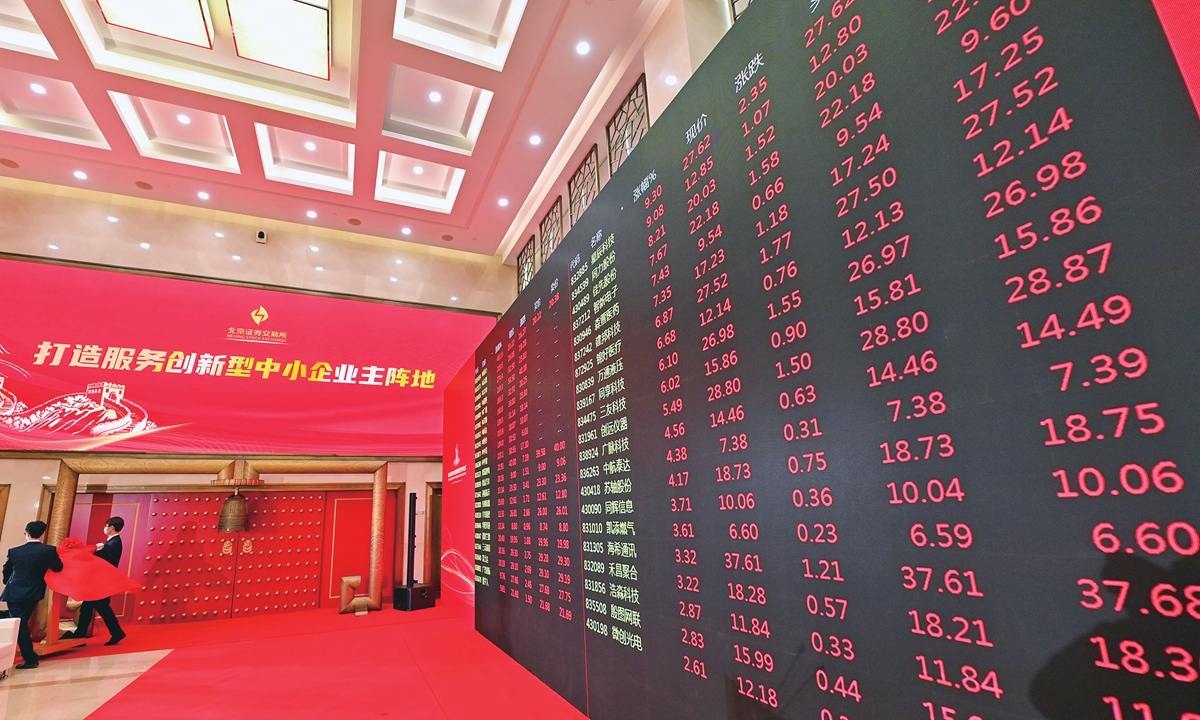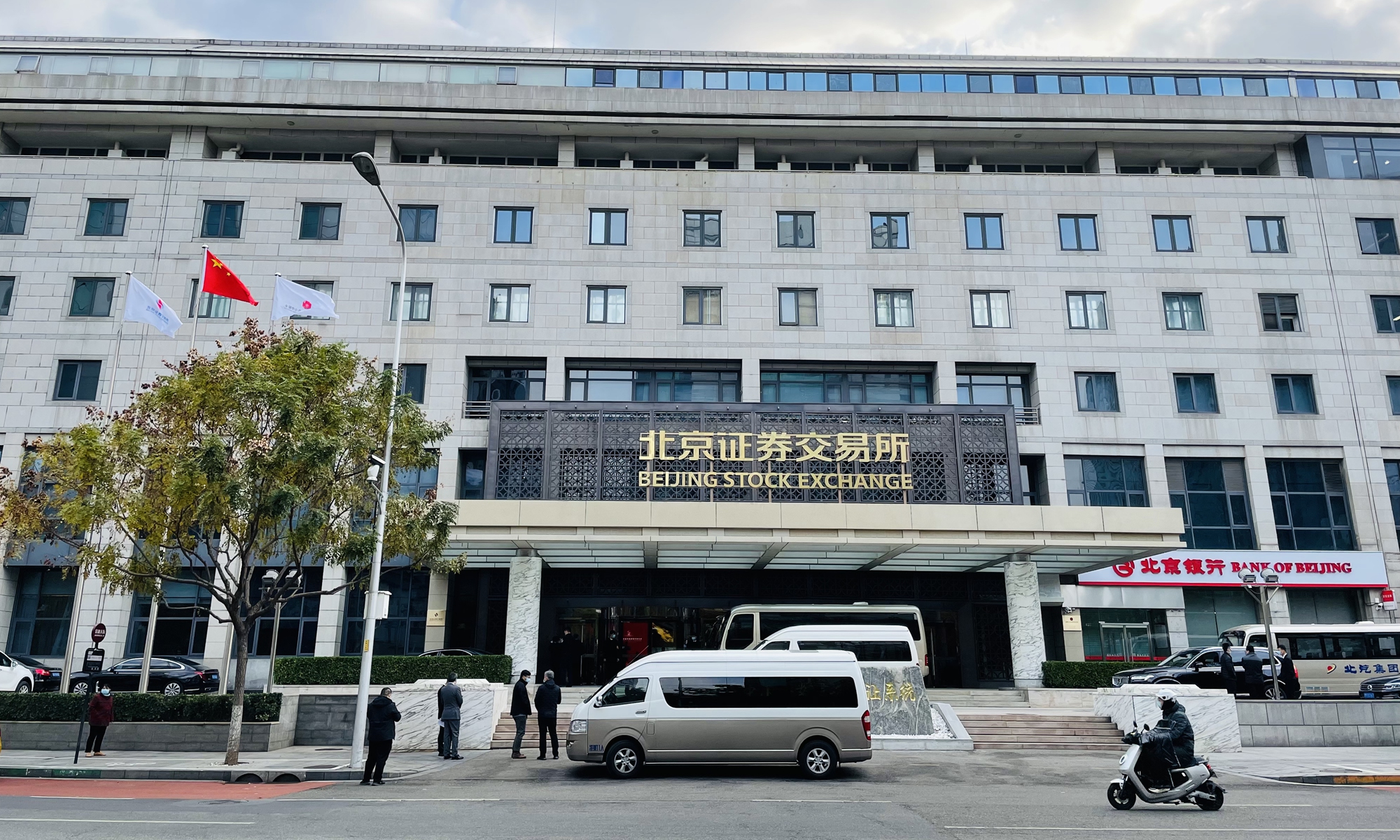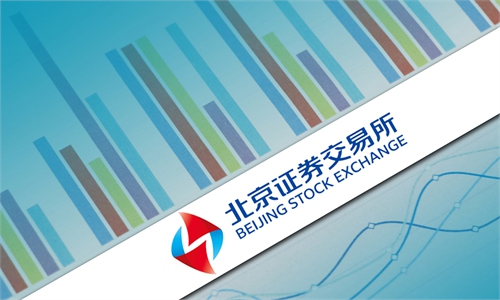
The newly-established Beijing Stock Exchange (BSE) starts trading on November 15, 2021 in Beijing, with the first batch of 81 companies debuting on the bourse and a turnover hitting 9.58 billion yuan ($1.5 billion). The firms listed include 10 that were newly approved and 71 that were transferred from the selected tier of China's National Equities Exchange and Quotations. Photo: Xinhua

Beijing Stock Exchange Photo:Chi Jingyi/GT
The Beijing Stock Exchange (BSE), which has been highly expected since its September announcement, was officially launched Monday with the debut of the first batch of 81 firms, officially inaugurating a third addition to China's A-share market alongside its 30-something-year-old big brothers in Shanghai and Shenzhen.
Hailed as a milestone in China's capital market and a stunningly efficient effort to set in motion a new exchange, merely 75 days after its announcement, the BSE availability indicates an "imperative" push to address fundraising woes for small- and medium-sized enterprises (SMEs) - the mainstay of China's innovation-oriented economic rebalancing, according to the Global Times' interviews with seasoned industry veterans and executives at several of the initial BSE listings.
A rally in shares of 10 firms that debuted on the new exchange triggered temporary trading halts in each of the new share offerings, with an average surge of 199.8 percent at the close, per data from the exchange. The turnover of the 10 firms, in addition to 71 listings migrated from an over-the-counter market, hit 9.58 billion yuan ($1.5 billion), the data showed. By Monday's close, the BSE had an entire market capitalization of about 289 billion yuan, according to Wind data.
About 100 shares are expected to trade on the new market by the year's end and trade-eligible investors are slated to top 10 million, 2.5 times the current number, according to market participants, envisioning the possibility that the new exchange will house the homecoming of overseas-listed Chinese shares and even revive plans for an international board for foreign firms to raise funds on BSE.
Historic moment
A short opening ceremony was held inside the BSE building in the heart of Beijing's financial street Monday morning, at which senior capital market officials announced resounding measures on the new exchange, a major platform that will serve innovation-centric smaller businesses.
Cai Qi, the Party chief of Beijing and Yi Huiman, chairman of the China Securities Regulatory Commission unveiled the new exchange and rang the BSE opening bell.
Tongxin Transmission, a manufacturer of automotive steering shafts based in Central China's Henan Province, was among the initial 10 new share offerings on Monday that all posted stellar gains. Tongxin led the surge with a rally of up to 537.47 percent intraday. Its shares closed up 493.67 percent.
In addition to the 10 new listings, shares of 71 firms previously traded on the selection tier of the National Equities Exchange and Quotations (NEEQ), an over-the-counter market known as the New Third Board (NTB), were also transferred to the new exchange on Monday, bringing the initial batch of BSE shares to 81 which are mostly in the fields of pharmaceuticals, software and specialized equipment manufacturing.
The BSE launch marked yet another milestone in the reform and development of China's capital market, Yi said during the opening ceremony, hailing the move as a major policy decision to drive quality development, ramp up financial support for small- and medium-sized enterprises (SMEs) and push for innovation-driven development and the economy's rebalancing and upgrading.
The vitality of the BSE lies in its distinctiveness, meaning that the exchange is poised to become a major platform for innovation-focused SMEs, Xu Ming, the new exchange's chairman, said during the BSE's opening ceremony.
Xu vowed to improve the BSE's policy, institutional and services systems to make it more tolerant, precise, innovative and vibrant.
In a sign of how high anticipation has been, Global Times reporters saw many investors waiting for the opening of the BSE across the road from the bourse's building on Monday, and some even brought cameras to record the moment.
Approximately 40 to 50 representatives from financial institutions, brokerages and enterprises attended the opening ceremony, a janitor with the BSE building told the Global Times, adding that the number of attendees was limited due to strict pandemic prevention measures.
The speedy availability of the new exchange "beats not only my expectations, but is entirely above market anticipation," Liu Ping'an, chairman of GGR Capital, a Beijing-based private equity firm that invests in 14 of the initial 81 BSE shares, told the Global Times over the weekend.
GGR Capital is currently investing in about 60 New Third Board-listed firms. Other than the 14 BSE shares, another BSE listing it has put money into is slated to begin trading after Monday, Liu disclosed.
Based on the experience of the STAR Market which was launched with 25 companies in July 2019 after being first announced in November 2018 at the inaugural China International Import Expo in Shanghai, the Beijing exchange was previously expected to begin trading next April or May, according to Liu.
The fast-tracked launch, he believes, can be attributed to an urgent need to deal with smaller businesses' financing difficulties, as well as a push for the economy's restructuring.
Before the end of the year, BSE listings are expected to hit 100, Liu predicted.
Presently, there are over 40 million firms in the country, of which 95 percent are considered SMEs, and the number of sci-tech-focused SMEs surpasses 220,000, according to numbers cited by BSE Chairman Xu in a speech in October, speaking of the tremendous room for improvement on the part of the financial market to serve SMEs.
An exchange in need
The new exchange is an "imperative" response to three long-standing challenges faced by SMEs: lack of access to funds, especially at an affordable cost; a tough path to A-share listing, even though registration-based IPO reforms have been put in place in the STAR Market and ChiNext board; and thorny exit routes for various investment funds to sell off stakes in SMEs, Zhou Yunnan, founder of Beijing-based Nanshan Capital, told the Global Times.
The BSE sets lower requirements in terms of financials and market cap than the Shanghai and Shenzhen markets, allowing for many more SMEs to "pursue advanced studies" via BSE floatations, according to Zhou, a senior NTB commentator, comparing the new exchange's launch to the central government's decision in 1999 to expand higher education enrolment.
Eligible investors will likely top 10 million in the foreseeable future, he predicted.
A spike in prices of raw materials and labor, among other manufacturing costs, and improvements required for innovative capabilities and fundraising challenges are among the major problems faced by SMEs, Xiang Youliang, chairman of Honsun (Nantong) Co, a healthcare equipment maker in East China's Jiangsu Province and one of the 81 BSE-traded firms, told the Global Times on Monday.
"The BSE availability fosters sci-tech innovation and invigorates the real economy, easing requirements for stock listings, thereby addressing financing dilemmas for the real economy," Xiang went on to say, seeing the new exchange as a much-needed boost to innovation-centered SMEs.
The main challenge facing SMEs is still difficult and costly access to funds, Dai Fuhao, chairman of BSE-listed Tonghui Jiashi (Beijing) Information Technology Co, told the Global Times on Monday.
"Fundraising needs are an indispensable part of the development of SMEs, in the case of business restructuring and strategic upgrading, but only a portion of them would be lucky enough to get funding," Dai stated, praising the BSE for being compatible with a greater number of SMEs throughout their growth path.
Flexible financing plans in small batches, typifying the new exchange and NTB, also bode well for smaller businesses' strategic development, he continued, assessing the BSE's tolerance in industry terms to solidify the structure and foundation of China's business community at large.
It is hoped that the Beijing exchange will hold onto its distinctive feature of being SMEs-targeted and allowing SMEs to raise funds in an efficient manner, according to Wang Yun, board secretary of BSE-traded Welltrans O&E Co, a video surveillance supplier located in Wuhan Optic Valley.
Broader vision
The viability of the BSE also fuels hopes for the exchange to house smaller-cap US-listed Chinese firms that have sought listings back on their home turf amid US regulatory tightening, and even the revival of a long-expected international board, according to insiders.
They spoke highly of the new market's would-be role in not merely addressing one of the biggest weak links in the northern part of the country but in uplifting the profile of the A-share market to take on its US counterpart.
Out of the three major Chinese metropolises of Shanghai, Shenzhen and Beijing, the capital city was the only one without a stock exchange, said a 66-year-old trader surnamed Chang.
"Now it is the turn of Beijing and northern China to have a stock exchange. I've been waiting for this for years," Chang told the Global Times on Monday outside the BSE building.
Additionally, plans for the international board to float not just overseas-listed Chinese shares but foreign firms seeking to list in the A-share market are possible, Liu Zimu, an often-cited source of insight into New Third Board, told the Global Times.
"This likelihood, if it materializes, would turn the BSE into China's NASDAQ," GGR Capital's Liu said.
Discussions on such an international board in Shanghai were all the rage in the 2010s, but have not been achieved thus far.
Unlike its counterparts in Shanghai and Shenzhen that were approved as a non-for-profit legal entity practicing membership governance, the BSE, structured as a limited liability company, is easily scalable, with no institutional barriers to its expansion to act as an international board, Liu Zimu explained.
There is still no timetable for this longer-term vision to become reality, as it's still contingent on how fast the country continues its capital account opening, the analyst said, emphasizing that the US market could take a hefty hit or even come under pressure to be replaced if that day comes.


